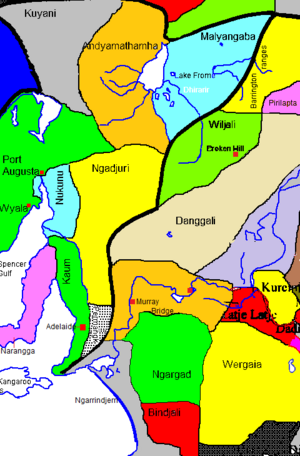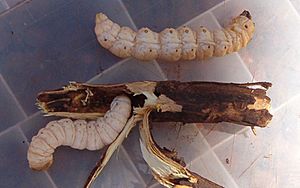Adnyamathanha language facts for kids
Quick facts for kids Adnyamathanha; Kuyani |
||||
|---|---|---|---|---|
| yura ngarwala | ||||
| Region | South Australia | |||
| Ethnicity | Adnyamathanha, Kuyani, Wailpi | |||
| Native speakers | 262 (2021 census) | |||
| Language family |
Pama–Nyungan
|
|||
| AIATSIS | L10 Adnyamathanha, L9 | |||

|
||||

|
||||
|
||||
The Adnyamathanha language (pronounced ahd-nyah-mah-duh-nuh), also known as yura ngarwala, and Kuyani are two closely related Australian Aboriginal languages. These languages belong to the Adnyamathanha and Kuyani peoples. They are traditionally spoken in the Flinders Ranges area of South Australia.
As of the 2016 Australian census, about 140 people spoke Adnyamathanha. This makes it an endangered language, meaning very few people still speak it. Sadly, no speakers of Kuyani have been recorded since 1975. A special bilingual dictionary for the Adnyamathanha language was published in 2020.
Did you know the name of the famous witchetty grub comes from the Adnyamathanha language?
Contents
Understanding Adnyamathanha and Kuyani
Some experts, like R. M. W. Dixon, consider Adnyamathanha and Guyani to be one single language. However, other important groups, such as Ethnologue, Glottolog, and AIATSIS, see them as two separate languages. They are very similar, but have their own unique features.
Who Speaks Adnyamathanha?
The number of people who speak Adnyamathanha has changed over the years. It is a severely endangered language, which means it's at high risk of disappearing. In 1973, only about 30 speakers were recorded. By 1996, the Australian census counted 127 speakers. The 2016 census found around 140 speakers. Efforts are being made to keep the language alive.
How the Language Works
Adnyamathanha has a really interesting way of using personal pronouns. These are words like "I," "you," "we," and "they." For example, there are 10 different ways to say "you and I" (which is called "first person dual"). The way you say it depends on the relationship between the person speaking and the person they are talking to. This shows how important relationships are in the culture.
The First Dictionary for Adnyamathanha
In the 1970s, a linguist named Bernhard Schebeck visited the Nepabunna region. He wrote a research dictionary, but it wasn't published for everyone to use. Later, in the 1980s, another linguist, Dorothy Tunbridge, also studied the language. Both of them helped us learn a lot about Adnyamathanha words.
In November 2020, the first-ever bilingual Adnyamathanha and English dictionary was finally published! It's called the Adnyamathanha Culture Guide and Language Book. This amazing 400-page book was put together by Terrence Coulthard and his wife Josephine.
Terrence Coulthard is an Adnyamathanha speaker himself. He spent 40 years collecting information about his culture and language. The book includes not just words, but also details about cultural practices, songlines (which are called muda), and the Adnyamathanha kinship system. Linguists from Adelaide University helped the Coulthards finish the book.
The Coulthards also run Iga Warta, a place where people can learn about Aboriginal culture. It's located near Nepabunna in the Gammon Ranges. The name Iga Warta means "native orange."
Special Words from Adnyamathanha
- Witchetty grub: The word witchetty comes from the Adnyamathanha word witjuri. This word is made up of wityu, meaning 'hooked stick', and vartu, meaning 'grub'. These grubs are an important food source and appear in many Aboriginal paintings.
- muda – This word means 'songline'. Songlines are important paths across the land that tell stories and hold knowledge through songs.
Different Names for the Language
The Adnyamathanha language has been known by many different names and spellings over time. Some of these include:
- Adnyamathanha, Adynyamathanha, Adjnjamathanha, Adnjamathanha, Anyamathana
- Wailpi, Wailbi, Waljbi (this is the name of a dialect)
- Archualda
- Benbakanjamata
- Binbarnja
- Gadjnjamada, Kanjimata
- Jandali
- Mardala
- Nimalda
- Nuralda
- Umbertana
- Yura ngarwala
The term Yura ngarwala is widely used for the Adnyamathanha language. It literally means 'people speak'. However, today, yura often refers specifically to an 'Adnyamathanha person'. So, the term now often means 'Adnyamathanha person speak'.
The Kuyani language is also spelled in different ways, such as Kijani, Kuyani, Kwiani.
 | Janet Taylor Pickett |
 | Synthia Saint James |
 | Howardena Pindell |
 | Faith Ringgold |


